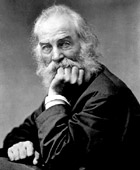The chasm feels wider because America and the Muslim world each insist on viewing the other through its own cultural lens. What Americans cherish as freedom, the Muslim world views as tending towards debauchery. What many Muslims consider pious restraint, Americans see as evidence of control by a misogynist theocracy. Amidst these tensions, Americans from all walks of life are reading Rumi. If the Muslim world and America are so seemingly incomprehensible to each other, how has a medieval dervish from the East nestled so close to America’s heart?
What is it about Rumi that attracts so many Americans? Some say it is our enchantment with the exotic, or our current affair with “New Age” spirituality. I think there is something deeper going on. My belief is that Rumi strikes a chord in America because he reminds us of a poet at the center of our own tradition, Walt Whitman. Like Rumi, Whitman saw the transcendent expressed in humanity: “Each of us inevitable, / Each of us limitless . . . / Each of us here as divinely as any is here.”
Like Rumi, Whitman sought connection with everywhere: “What cities the light or warmth penetrates I penetrate those cities / myself, / All islands to which birds wing their way I wing my way / myself.” Like Rumi, Whitman loved the different voices of the world: “I hear the Arab muezzin calling from the top of the mosque, . . . / I hear the Christian priests at the altars of their churches, / I hear the Hebrew reading his records and psalms, . . . / I hear the Hind(u) teaching his favorite pupil.”
As Rumi wrote out of the Muslim tradition, Whitman was rooted in the American one. He once said, “I know ver y well that my ‘Leaves (of Grass)’ could not possibly have emerged or been fashion’d completed, from any other era than the latter half of the Nineteenth Century, nor any other land than democratic America.” Whitman and Rumi, Islam and America Had they been aware of one another’s work (and who knows, in some other dimension they may be engaged in sohbet !), Whitman might consider Rumi a kindred American transcendentalist, and Rumi would be forgiven for thinking Whitman had a sufi soul.
What might the similarities between Rumi and Whitman signify? First, poetry can express both the uniqueness of a tradition and give glimpses into matters universally human. This ability to articulate particularity while high- lighting commonality makes poetry an excellent medium for dialogue between two traditions. And in a world where differences are so often the cause for killing, finding ways to dialogue is a necessity not a luxury. Second, the similarities between Rumi and Whitman show us that Islam and America, despite their differences, do not inevitably have to be at odds. The poets have pointed out surprising affinities between the spirits of the two civi- lizations. As a Muslim and an American, I have been nurtured by both traditions. And there is no clash of civilizations in my soul.
























































0 comments:
Post a Comment